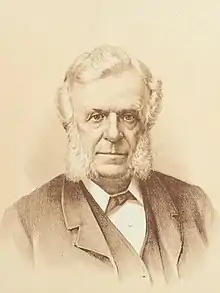John Watt (politician)
John Brown Watt (16 May 1826 – 28 September 1897) was a Scottish-born Australian businessman, banker, and politician. Watt was a member of the New South Wales Legislative Council in Sydney and a board member of the Imperial Federation League in London.[1] Outside of state politics, he was a director of the Union Bank of Australia (now the Australia and New Zealand Banking Group Limited) and the Colonial Sugar Refining Company. He was also a director of the Sydney Infirmary and Dispensary and the Royal Prince Alfred Hospital, as well as the founder of the Hospital for Sick Children, Glebe.[2]
John Brown Watt | |
|---|---|
 | |
| Member of Legislative Council of New South Wales | |
| In office 11 September 1861 – 20 April 1867 | |
| In office 11 September 1874 – 22 March 1890 | |
| Personal details | |
| Born | 26 May 1826 Edinburgh, Scotland |
| Died | 28 September 1897 (aged 71) Sydney, New South Wales, Australia |
| Citizenship | |
| Political party | Free Trade |
| Children | Oswald Watt |
| Parents |
|
| Relatives | George Holden (father-in-law) Susan Watt (granddaughter) |
| Alma mater | University of Edinburgh |
Early life
Watt was born in Edinburgh, Mid-Lothian, Scotland, the eldest son of Royal Navy officer Alexander Hamilton Watt and his wife Margaret (née Gilchrist).[1] His father was a relative of James Watt, inventor of the steam-engine and namesake of the watt energy metric.[3] Watt graduated from the University of Edinburgh in 1840 and emigrated to Sydney via the Benares in 1842.[1]
Early career
Watt was appointed a member of the New South Wales Legislative Council in September 1861,[4] but resigned on leaving for England in March 1866.[5] He was reappointed in October 1874. In 1877 he presented the sum of £1000 to the University of Sydney to found an exhibition for students from primary schools. He presided over the Royal Commission on Military Defences of 1881.
Later career
He was the Commissioner for New South Wales at the International Exhibitions of Philadelphia (1876), Paris (1878), Sydney (1879), Amsterdam (1883) and at Calcutta (1883–84). In 1884, he was invited to the United Kingdom to join the Executive Committee of the Imperial Federation League.[6] In 1890, he forfeited his Legislative Council seat due to absence in England.[5][7]
Further details
Watt died in Bournemouth, Dorset on 28 September 1897.[1] He was survived by three of his five sons and five daughters, the youngest son was Oswald Watt, OBE a celebrated aviator. Another son, Ernest Watt, became the father-in-law of Sir Laurence Whistler Street when he married Ernest's daughter Susan Gai Watt, herself the first female chair of the Eastern Sydney Health Service (now amalgamated with Illawarra).[1]
References
- Walsh, G P. "Watt, John Brown (1826–1897)". Australian Dictionary of Biography. National Centre of Biography, Australian National University. ISSN 1833-7538. Retrieved 23 October 2013.
- E. A. S. Watt, A Few Records of the Life of John Brown Watt (Syd, priv print, nd)
- Carnegie, Andrew. James Watt. The Minerva Group, Inc. p. 215. ISBN 9780898755787.
- "Mr John Brown Watt (1826-1897)". Former members of the Parliament of New South Wales. Retrieved 15 June 2019.
- Mennell, Philip (1892). . The Dictionary of Australasian Biography. London: Hutchinson & Co – via Wikisource.
- Digby, Everard, ed. (1889). Australian men of mark (PDF). Vol. 1. Sydney: Charles F Maxwell. p. 79-80. Retrieved 11 February 2021.
- "Seat vacated" (PDF). Parliamentary Debates (Hansard). New South Wales: Legislative Council. 29 April 1890. p. 3.